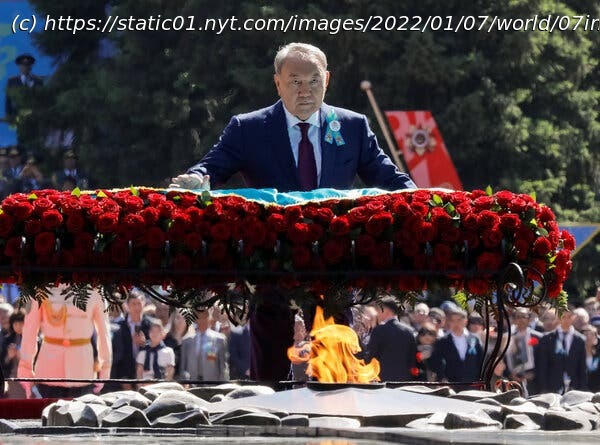Since the Cold War’s end, most dictatorial governments have collapsed after their ruler’s departure.
Kazakhstan’s explosion into unrest this week presents a stark warning to the strongman autocrats of the world: Leaving office is perilous. Since the Cold War’s end, a staggering 70 percent of governments headed by strongmen collapsed after the ruler departed, according to one data set. The trend holds whether the leader leaves voluntarily or involuntarily, dies in office or retires to a country home. Sometimes, as in Spain after Francisco Franco’s death in 1975, it opens the way to democratization. More often, as in Egypt, Sudan, Zimbabwe and many others, the result is a cycle of coups, civil conflict or other violence. Nursultan Nazarbayev, Kazakhstan’s lifelong leader until he began gradually handing power to a successor in 2019, was, by all appearances, keenly aware of this problem. He told an interviewer in 2014 that any country like his needed “a sustainable system put in place that would be stable against the backdrop of a new leader’s arrival,” ticking through Malaysia or Singapore as possible models. Mr. Nazarbayev stage-managed his own departure in ways that suggest painstaking attention to the lessons of history, and his transition was watched closely in Moscow and other capitals as a potential model. His departure does not appear to have specifically set off Kazakhstan’s protests. But the unrest, the government’s failure to maintain support and now its flailing response are typical of the divided, disoriented bureaucracies that often falter after a strongman’s departure. The lesson, experts stress, is hardly that strongmen bring stability. Quite the opposite: Their style of rule erodes the foundations of governance, making themselves indispensable at the cost of leaving behind a political system barely capable of governing but primed for infighting. Autocrats like Mr. Nazarbayev who stand alone at the top, as opposed to those who rule on behalf of a larger party apparatus as in Cuba or Vietnam, face a tricky challenge. They must strike a balance between all of their country’s internal factions, ruling elites, security services and military brass, guaranteeing each enough power and spoils to keep them bought in, but without letting any grow powerful enough to challenge them.






